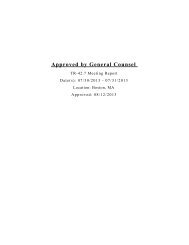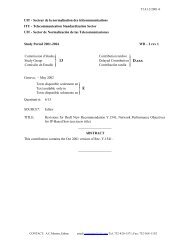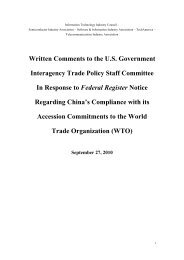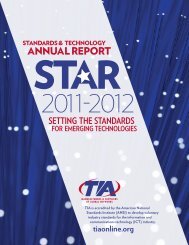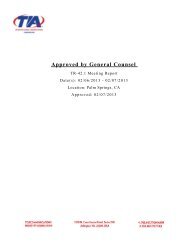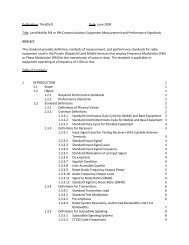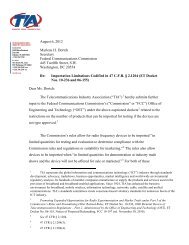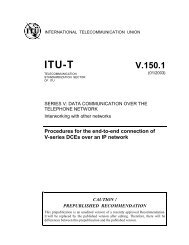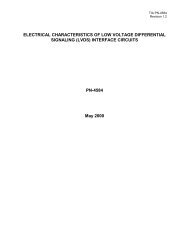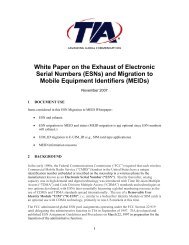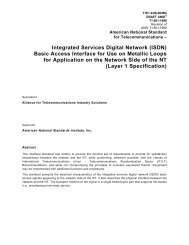Comments on China's Draft Telecom Law - Telecommunications ...
Comments on China's Draft Telecom Law - Telecommunications ...
Comments on China's Draft Telecom Law - Telecommunications ...
Create successful ePaper yourself
Turn your PDF publications into a flip-book with our unique Google optimized e-Paper software.
We recommend that China c<strong>on</strong>sider establishing a c<strong>on</strong>vergent, independent, regulator asthe central authority governing the c<strong>on</strong>verging telecom, Internet media, and broadcastindustries. We also recommend a multi-tiered, principle-based (as opposed to rulesbased)regulatory framework that employs both traditi<strong>on</strong>al command-and-c<strong>on</strong>trolapproaches and light-touch approaches such as industry self-regulati<strong>on</strong> and/or coregulati<strong>on</strong>,depending <strong>on</strong> the nature and maturity of the service under c<strong>on</strong>siderati<strong>on</strong>.Article3. China should be commended for realizing the important benefits oftelecommunicati<strong>on</strong>s networks to developing the Chinese ec<strong>on</strong>omy. Unfortunately,regulatory processes in China today exist without clearly defined regulatoryresp<strong>on</strong>sibilities. While MIIT has been, in practice, the lead agency with respect toregulating the <strong>Telecom</strong>municati<strong>on</strong>s sector, other government organs (SARFT, SEMB,CNCA, etc) also play a role. It would be helpful to industry if the <strong>Telecom</strong>municati<strong>on</strong>slaw could clearly define what c<strong>on</strong>stitutes the “competent telecommunicati<strong>on</strong>s authorities”and, in additi<strong>on</strong>, their areas of policy resp<strong>on</strong>sibility with respect to thetelecommunicati<strong>on</strong>s sector. With this in mind, we remind China of its WTO Basic<strong>Telecom</strong>municati<strong>on</strong>s Agreement Reference Paper commitment to establish anindependent regulator. MIIT, with its multiple policy and industry functi<strong>on</strong>s has a clearc<strong>on</strong>flict of interest when it comes to regulating the telecommunicati<strong>on</strong>s industry in an<strong>on</strong>discriminatory and transparent manner.We applaud the State’s support and promoti<strong>on</strong> of network c<strong>on</strong>vergence and theencouragement of cross-entry am<strong>on</strong>g telecom and broadcast service providers. Webelieve that these policy advancements will nurture healthy and increased marketcompetiti<strong>on</strong> and benefit both the c<strong>on</strong>sumers and the nati<strong>on</strong>’s ec<strong>on</strong>omy as a whole. Wenotice, however, the subtle difference in that broadcast organizati<strong>on</strong>s are encouraged toengage in the telecom business (with no limitati<strong>on</strong>s) while telecom operators areencouraged to engage in radio and TV transmissi<strong>on</strong> businesses, which seems to limit thetelecom operators to <strong>on</strong>ly the transmissi<strong>on</strong> aspect of radio and TV businesses. As radioand TV services migrate <strong>on</strong>to digital and interactive technology platforms, the associatedbusiness models also undergo tremendous change and often require end-to-end businessintegrati<strong>on</strong> across c<strong>on</strong>tent packaging, c<strong>on</strong>tent delivery (transmissi<strong>on</strong>), and c<strong>on</strong>tentpresentati<strong>on</strong> (user interfaces/devices) in order to enable service innovati<strong>on</strong> and maintainservice competitiveness. As such, we recommend that the qualifier term “transmissi<strong>on</strong>”in the last sentence of Article 3 be removed to signify the encouragement of truly equalentry am<strong>on</strong>g telecom and broadcast service operators.Article 4. We applaud China for including an Article in the law that protects citizens’freedom and privacy. In the same spirit, we urge China to c<strong>on</strong>sider an additi<strong>on</strong> to theArticle giving c<strong>on</strong>sumers the freedom to choose a telecommunicati<strong>on</strong>s service provider,thus reinforcing steps taken to create competiti<strong>on</strong> in the Chinese telecommunicati<strong>on</strong>smarket.Article 5. We recognize China’s c<strong>on</strong>cern with respect to misuse of thetelecommunicati<strong>on</strong>s networks. However, it is important from a legal perspective for



